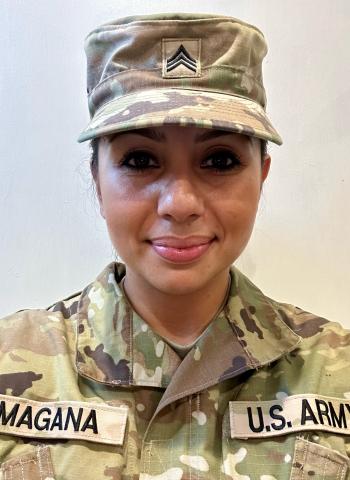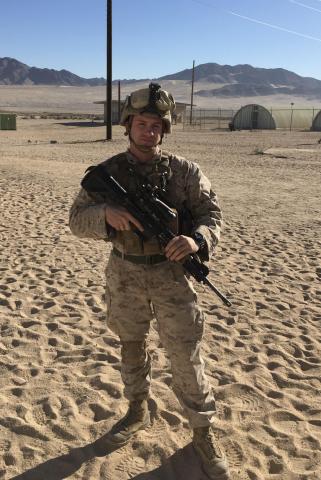
Two PhD Students Tell How Military Service Influenced Their Psychology Careers
Palo Alto University (PAU) recognizes the service of our many students who are veterans or on active military duty. In honor of Veteran’s Day, we would like to share the experiences of two student veterans, David Rouxel and Michelle Magana, who are pursuing doctorates in clinical psychology to ultimately help their fellow veterans in need of mental health support.
Here are their stories:

Michelle Magana
Michelle Magana was working as a mental health clinician at a San Jose, CA, behavioral health facility when she discovered that many of her clients who were involved in criminal justice were exhibiting similar patterns of trauma as military and first responders, even though their experiences were quite different. This fascinated Michelle, and she wanted to learn why.
“It occurred to me that I could better understand their trauma if I had the first-hand military experience to see things from their perspective,” said Magana. “I was ready to try something completely different that could tie back to my counseling work and better serve the population I was treating."
In 2020, upon earning her master’s degree in counseling psychology at Santa Clara University, Magana enlisted in the U.S. Army. “It was during the pandemic, and there was a lot of chaos in the world. I felt it was a really good time to join,” she said.
In June 2021, Michelle was deployed to Kuwait. Over the next 11 months, she would also be stationed in Qatar and a combat zone in the Middle East. “There was a lot of turmoil with the rebels who would shoot missiles near the base where I was located. There were a lot of close calls,” said Magana. Many of her Army colleagues had served in the military much longer than she had, and they experienced much more intense combat and trauma. She noticed how specific incidences, like sirens going off or suddenly having to take cover, triggered their Post-Traumatic Stress Disorder (PTSD) symptoms. Magana found the experience eye-opening as she witnessed first-hand the development of her colleague’s trauma symptoms over the next 11 months.
“While I wasn’t qualified to help them, many of my fellow colleagues knew I had studied to be a clinician, so they would talk to me about what was happening to them.I was a listening ear,” she said.
Magana returned from active duty in May 2022 and immediately enrolled at PAU to pursue a PhD in clinical psychology, where she is currently a first-year student. She also continues to serve, in the US Army Reserve, and works part-time at Momentum for Health in San Jose. Magana's goal upon completing her doctoral work at PAU is to work at the Veteran’s Administration hospital and conduct assessments for trauma and PTSD. She said her military experience provided her with a living case study.
“I was able grow both as a clinician and as a soldier, an experience I could not have received anywhere else."

David Rouxel
Growing up outside of Paris, France, David Rouxel and his two siblings experienced the hardship and anxiety of being raised by a mentally unstable parent who, despite family efforts, refused treatment. At age 22, with little money or proficiency with the English language, David moved to California with a strong determination to succeed and be a positive role model for his younger brothers. To gain US citizenship, he enlisted in the US Marine Corps where he served four years of active duty as a corporal in the infantry.
“This experience changed my life forever,” Rouxel said.
Upon completing his service in 2018, Rouxel chose to study business because of a burning desire to apply the best business and management theories at the Department of Veterans Affairs (VA) and improve the lives of veterans. He enrolled at the City College of San Francisco and simultaneously began cognitive behavioral therapy to address his own mental health problems.
“This was my first introduction to psychology,” he said. “Psychology soon became very personal and much more than a simple hobby.”
Rouxel saw many of his veteran friends battling mental health issues during their transition from active duty to civilian life. “I experienced first-hand the positive impact therapists had on the lives of veterans."
After transferring to the Haas School of Business at University of California-Berkeley, Rouxel served an internship as a supply chain analyst at the VA Palo Alto Healthcare System. On his lunch breaks, he would eat with other veterans in the cafeteria where people would see his badge and come speak to him about their struggles. Because Rouxel was a veteran he could empathize and build their trust. It was this experience that enlightened him to the need for more clinical psychologists, especially psychologists who had served in the military, with whom veterans felt more comfortable sharing their problems.
While Rouxel felt his business degree could help make a difference at the VA, he eventually felt his true calling was to help other veterans as a psychologist. After earning a Bachelor of Science in business administration at UC Berkeley, he enrolled at PAU to pursue a PhD in clinical psychology. Rouxel said he is grateful for PAU's participation in the Yellow Ribbon Program and for the Post 9/11 GI Bill.
To meet his PhD program prerequisites, Rouxel took many undergraduate psychology courses. “These classes were transformative and increased my desire to become a clinical psychologist," he said. "I had always been curious about and enjoyed understanding human behavior.”
Rouxel says his life experiences - his rough upbringing, his time as a Marine, his own mental illness - have now taken on new meaning through his psychology courses. “I have become even more committed to using my experiences to help others,” he said.
